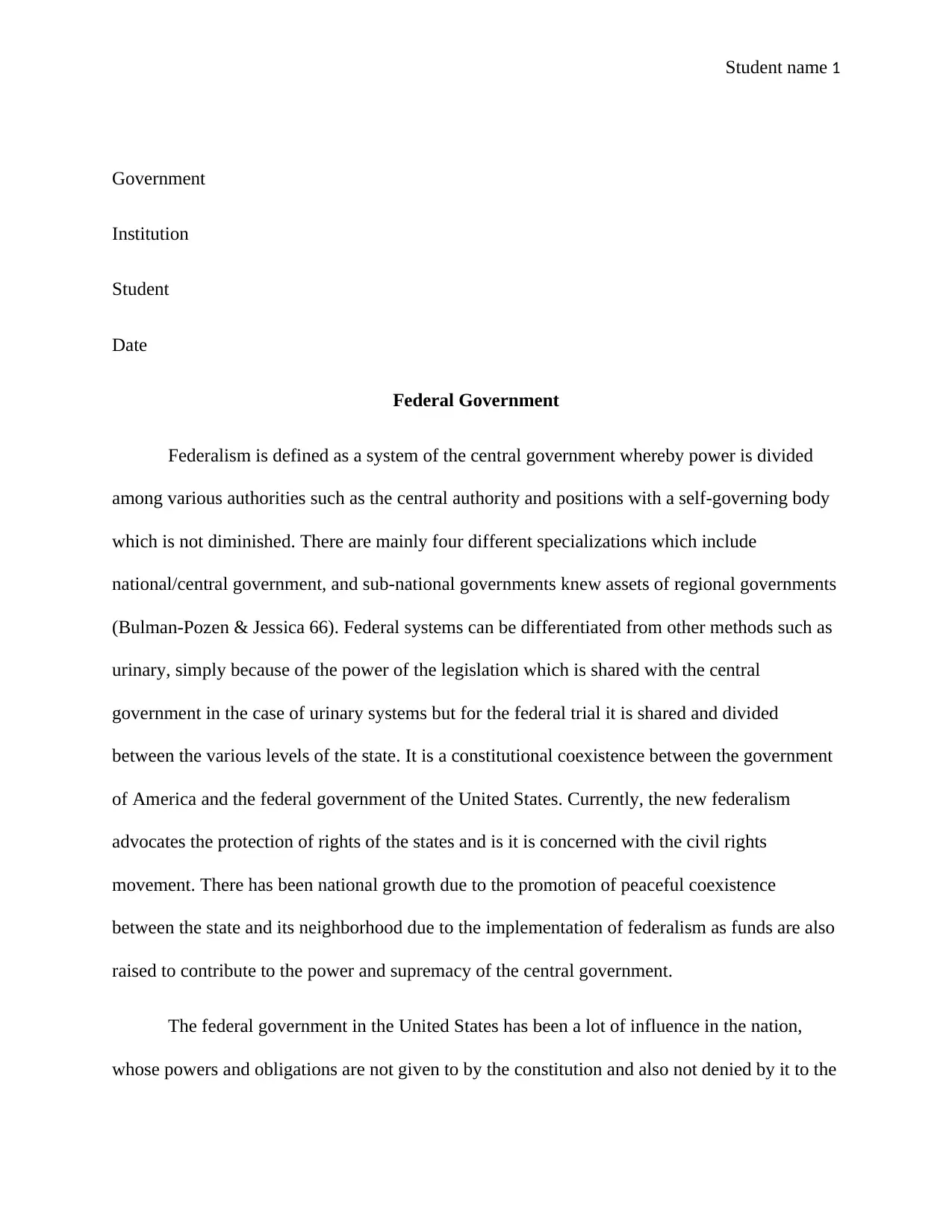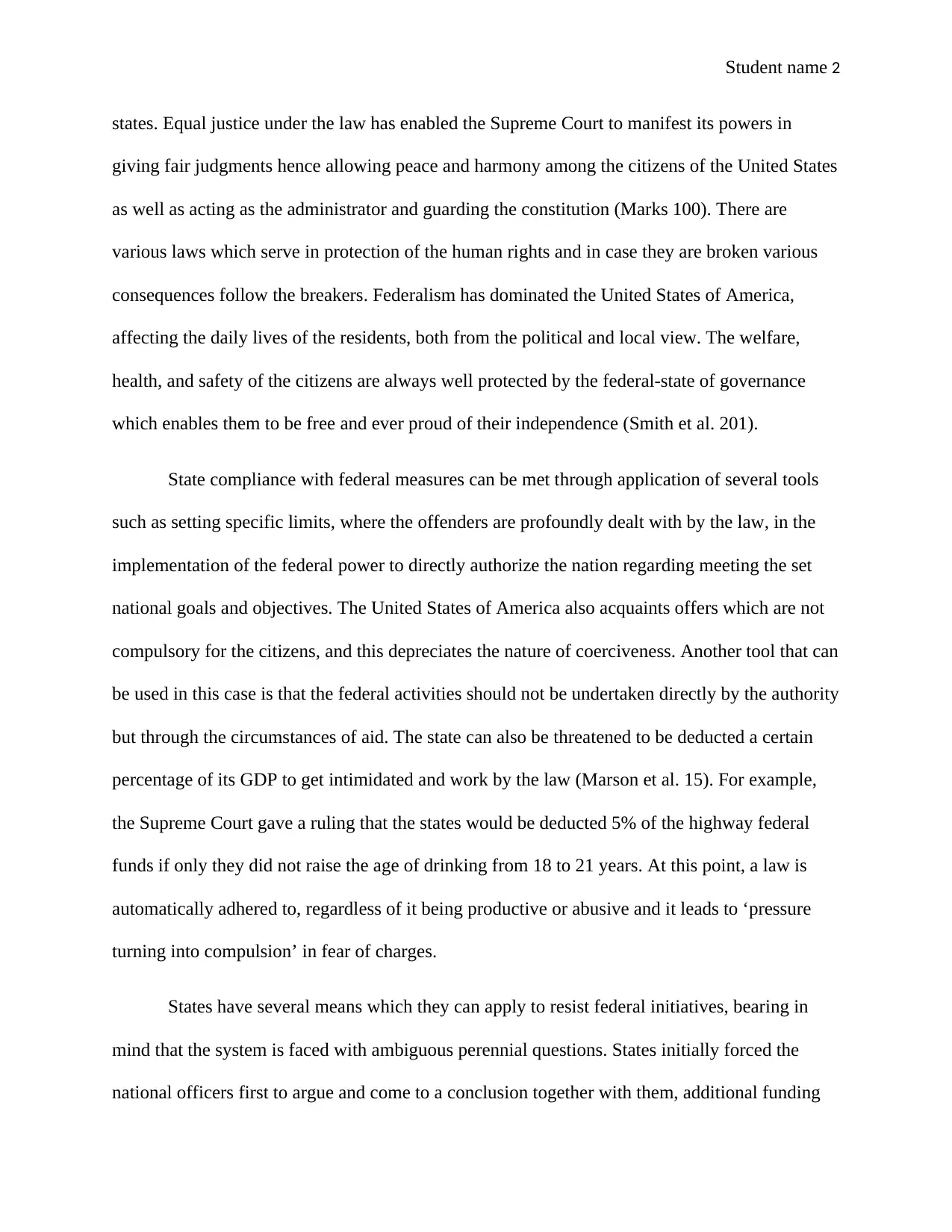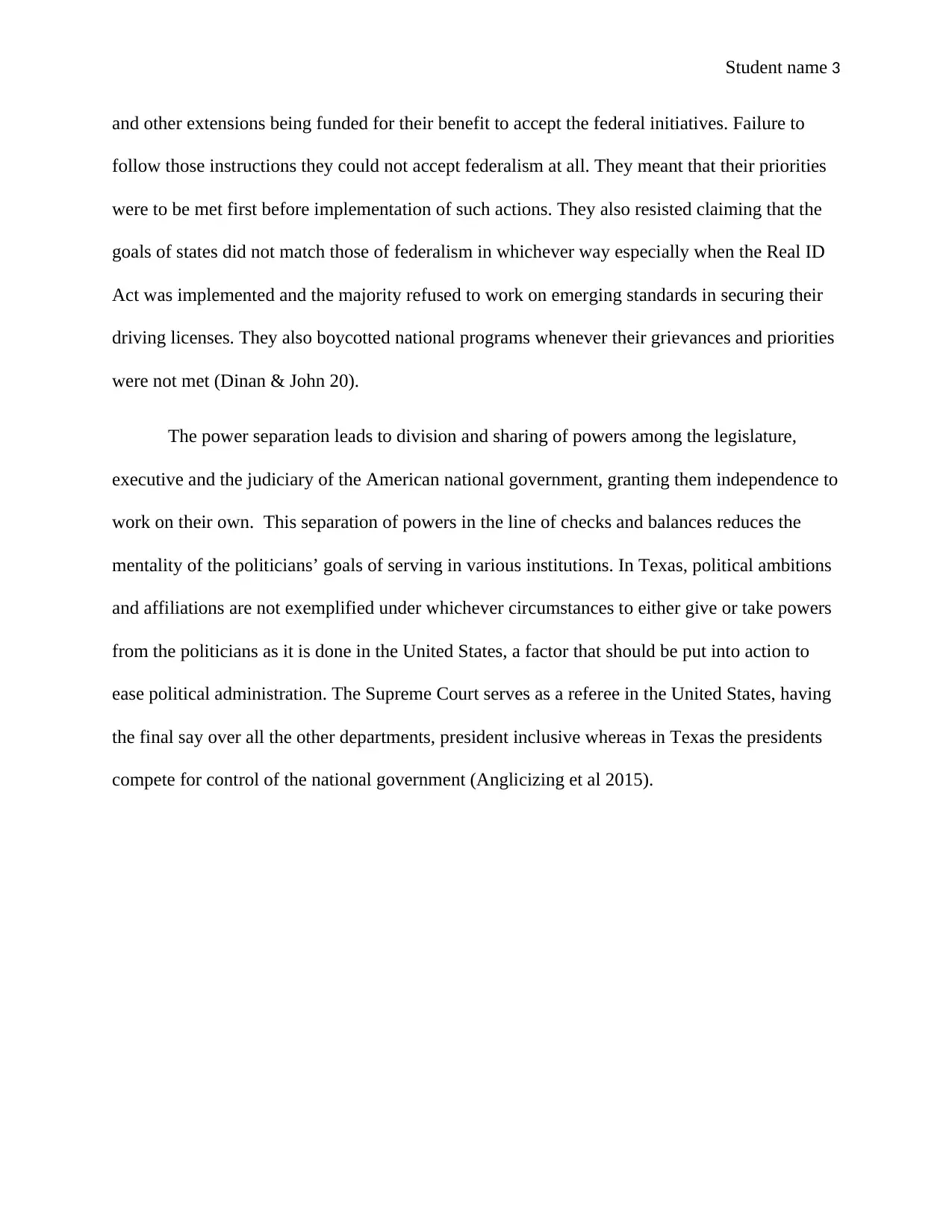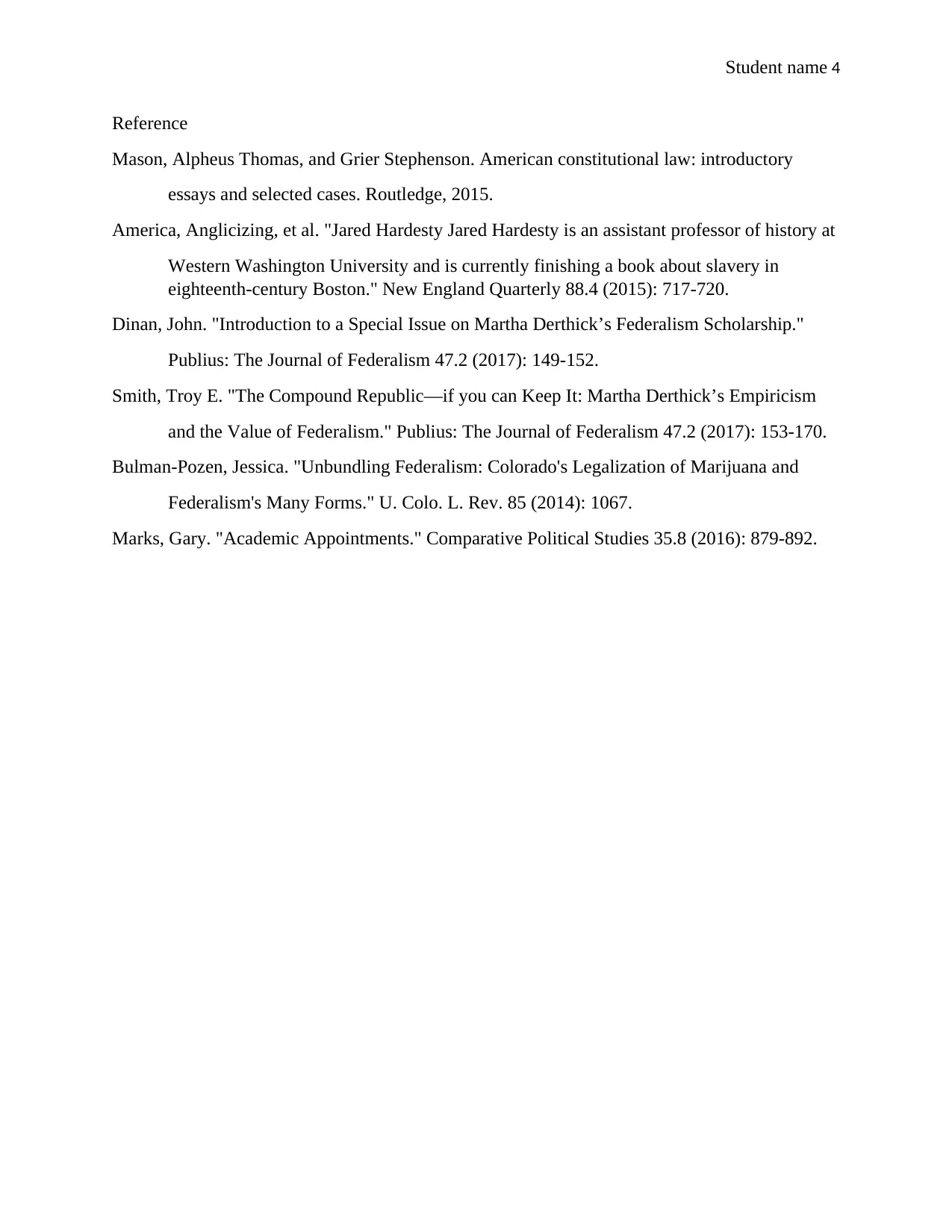Federalism and Its Impact on the United States Government
VerifiedAdded on 2020/05/08
|4
|1066
|60
Essay
AI Summary
This essay provides a comprehensive overview of federalism in the United States, defining it as a system where power is divided between central and regional governments. It explores the influence of the federal government, the role of the Supreme Court in ensuring justice, and the impact of federalism on citizens' lives. The essay examines tools used for state compliance with federal measures, such as setting limits and offering incentives, as well as instances of state resistance. It also highlights the separation of powers and the checks and balances within the US government, comparing it to the political dynamics in Texas. The essay references several scholarly sources to support its arguments, providing a well-rounded analysis of federalism's complexities and its ongoing relevance in American governance.

Student name 1
Government
Institution
Student
Date
Federal Government
Federalism is defined as a system of the central government whereby power is divided
among various authorities such as the central authority and positions with a self-governing body
which is not diminished. There are mainly four different specializations which include
national/central government, and sub-national governments knew assets of regional governments
(Bulman-Pozen & Jessica 66). Federal systems can be differentiated from other methods such as
urinary, simply because of the power of the legislation which is shared with the central
government in the case of urinary systems but for the federal trial it is shared and divided
between the various levels of the state. It is a constitutional coexistence between the government
of America and the federal government of the United States. Currently, the new federalism
advocates the protection of rights of the states and is it is concerned with the civil rights
movement. There has been national growth due to the promotion of peaceful coexistence
between the state and its neighborhood due to the implementation of federalism as funds are also
raised to contribute to the power and supremacy of the central government.
The federal government in the United States has been a lot of influence in the nation,
whose powers and obligations are not given to by the constitution and also not denied by it to the
Government
Institution
Student
Date
Federal Government
Federalism is defined as a system of the central government whereby power is divided
among various authorities such as the central authority and positions with a self-governing body
which is not diminished. There are mainly four different specializations which include
national/central government, and sub-national governments knew assets of regional governments
(Bulman-Pozen & Jessica 66). Federal systems can be differentiated from other methods such as
urinary, simply because of the power of the legislation which is shared with the central
government in the case of urinary systems but for the federal trial it is shared and divided
between the various levels of the state. It is a constitutional coexistence between the government
of America and the federal government of the United States. Currently, the new federalism
advocates the protection of rights of the states and is it is concerned with the civil rights
movement. There has been national growth due to the promotion of peaceful coexistence
between the state and its neighborhood due to the implementation of federalism as funds are also
raised to contribute to the power and supremacy of the central government.
The federal government in the United States has been a lot of influence in the nation,
whose powers and obligations are not given to by the constitution and also not denied by it to the
Paraphrase This Document
Need a fresh take? Get an instant paraphrase of this document with our AI Paraphraser

Student name 2
states. Equal justice under the law has enabled the Supreme Court to manifest its powers in
giving fair judgments hence allowing peace and harmony among the citizens of the United States
as well as acting as the administrator and guarding the constitution (Marks 100). There are
various laws which serve in protection of the human rights and in case they are broken various
consequences follow the breakers. Federalism has dominated the United States of America,
affecting the daily lives of the residents, both from the political and local view. The welfare,
health, and safety of the citizens are always well protected by the federal-state of governance
which enables them to be free and ever proud of their independence (Smith et al. 201).
State compliance with federal measures can be met through application of several tools
such as setting specific limits, where the offenders are profoundly dealt with by the law, in the
implementation of the federal power to directly authorize the nation regarding meeting the set
national goals and objectives. The United States of America also acquaints offers which are not
compulsory for the citizens, and this depreciates the nature of coerciveness. Another tool that can
be used in this case is that the federal activities should not be undertaken directly by the authority
but through the circumstances of aid. The state can also be threatened to be deducted a certain
percentage of its GDP to get intimidated and work by the law (Marson et al. 15). For example,
the Supreme Court gave a ruling that the states would be deducted 5% of the highway federal
funds if only they did not raise the age of drinking from 18 to 21 years. At this point, a law is
automatically adhered to, regardless of it being productive or abusive and it leads to ‘pressure
turning into compulsion’ in fear of charges.
States have several means which they can apply to resist federal initiatives, bearing in
mind that the system is faced with ambiguous perennial questions. States initially forced the
national officers first to argue and come to a conclusion together with them, additional funding
states. Equal justice under the law has enabled the Supreme Court to manifest its powers in
giving fair judgments hence allowing peace and harmony among the citizens of the United States
as well as acting as the administrator and guarding the constitution (Marks 100). There are
various laws which serve in protection of the human rights and in case they are broken various
consequences follow the breakers. Federalism has dominated the United States of America,
affecting the daily lives of the residents, both from the political and local view. The welfare,
health, and safety of the citizens are always well protected by the federal-state of governance
which enables them to be free and ever proud of their independence (Smith et al. 201).
State compliance with federal measures can be met through application of several tools
such as setting specific limits, where the offenders are profoundly dealt with by the law, in the
implementation of the federal power to directly authorize the nation regarding meeting the set
national goals and objectives. The United States of America also acquaints offers which are not
compulsory for the citizens, and this depreciates the nature of coerciveness. Another tool that can
be used in this case is that the federal activities should not be undertaken directly by the authority
but through the circumstances of aid. The state can also be threatened to be deducted a certain
percentage of its GDP to get intimidated and work by the law (Marson et al. 15). For example,
the Supreme Court gave a ruling that the states would be deducted 5% of the highway federal
funds if only they did not raise the age of drinking from 18 to 21 years. At this point, a law is
automatically adhered to, regardless of it being productive or abusive and it leads to ‘pressure
turning into compulsion’ in fear of charges.
States have several means which they can apply to resist federal initiatives, bearing in
mind that the system is faced with ambiguous perennial questions. States initially forced the
national officers first to argue and come to a conclusion together with them, additional funding

Student name 3
and other extensions being funded for their benefit to accept the federal initiatives. Failure to
follow those instructions they could not accept federalism at all. They meant that their priorities
were to be met first before implementation of such actions. They also resisted claiming that the
goals of states did not match those of federalism in whichever way especially when the Real ID
Act was implemented and the majority refused to work on emerging standards in securing their
driving licenses. They also boycotted national programs whenever their grievances and priorities
were not met (Dinan & John 20).
The power separation leads to division and sharing of powers among the legislature,
executive and the judiciary of the American national government, granting them independence to
work on their own. This separation of powers in the line of checks and balances reduces the
mentality of the politicians’ goals of serving in various institutions. In Texas, political ambitions
and affiliations are not exemplified under whichever circumstances to either give or take powers
from the politicians as it is done in the United States, a factor that should be put into action to
ease political administration. The Supreme Court serves as a referee in the United States, having
the final say over all the other departments, president inclusive whereas in Texas the presidents
compete for control of the national government (Anglicizing et al 2015).
and other extensions being funded for their benefit to accept the federal initiatives. Failure to
follow those instructions they could not accept federalism at all. They meant that their priorities
were to be met first before implementation of such actions. They also resisted claiming that the
goals of states did not match those of federalism in whichever way especially when the Real ID
Act was implemented and the majority refused to work on emerging standards in securing their
driving licenses. They also boycotted national programs whenever their grievances and priorities
were not met (Dinan & John 20).
The power separation leads to division and sharing of powers among the legislature,
executive and the judiciary of the American national government, granting them independence to
work on their own. This separation of powers in the line of checks and balances reduces the
mentality of the politicians’ goals of serving in various institutions. In Texas, political ambitions
and affiliations are not exemplified under whichever circumstances to either give or take powers
from the politicians as it is done in the United States, a factor that should be put into action to
ease political administration. The Supreme Court serves as a referee in the United States, having
the final say over all the other departments, president inclusive whereas in Texas the presidents
compete for control of the national government (Anglicizing et al 2015).
⊘ This is a preview!⊘
Do you want full access?
Subscribe today to unlock all pages.

Trusted by 1+ million students worldwide

Student name 4
Reference
Mason, Alpheus Thomas, and Grier Stephenson. American constitutional law: introductory
essays and selected cases. Routledge, 2015.
America, Anglicizing, et al. "Jared Hardesty Jared Hardesty is an assistant professor of history at
Western Washington University and is currently finishing a book about slavery in
eighteenth-century Boston." New England Quarterly 88.4 (2015): 717-720.
Dinan, John. "Introduction to a Special Issue on Martha Derthick’s Federalism Scholarship."
Publius: The Journal of Federalism 47.2 (2017): 149-152.
Smith, Troy E. "The Compound Republic—if you can Keep It: Martha Derthick’s Empiricism
and the Value of Federalism." Publius: The Journal of Federalism 47.2 (2017): 153-170.
Bulman-Pozen, Jessica. "Unbundling Federalism: Colorado's Legalization of Marijuana and
Federalism's Many Forms." U. Colo. L. Rev. 85 (2014): 1067.
Marks, Gary. "Academic Appointments." Comparative Political Studies 35.8 (2016): 879-892.
Reference
Mason, Alpheus Thomas, and Grier Stephenson. American constitutional law: introductory
essays and selected cases. Routledge, 2015.
America, Anglicizing, et al. "Jared Hardesty Jared Hardesty is an assistant professor of history at
Western Washington University and is currently finishing a book about slavery in
eighteenth-century Boston." New England Quarterly 88.4 (2015): 717-720.
Dinan, John. "Introduction to a Special Issue on Martha Derthick’s Federalism Scholarship."
Publius: The Journal of Federalism 47.2 (2017): 149-152.
Smith, Troy E. "The Compound Republic—if you can Keep It: Martha Derthick’s Empiricism
and the Value of Federalism." Publius: The Journal of Federalism 47.2 (2017): 153-170.
Bulman-Pozen, Jessica. "Unbundling Federalism: Colorado's Legalization of Marijuana and
Federalism's Many Forms." U. Colo. L. Rev. 85 (2014): 1067.
Marks, Gary. "Academic Appointments." Comparative Political Studies 35.8 (2016): 879-892.
1 out of 4
Related Documents
Your All-in-One AI-Powered Toolkit for Academic Success.
+13062052269
info@desklib.com
Available 24*7 on WhatsApp / Email
![[object Object]](/_next/static/media/star-bottom.7253800d.svg)
Unlock your academic potential
Copyright © 2020–2026 A2Z Services. All Rights Reserved. Developed and managed by ZUCOL.





